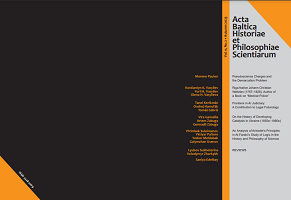An Analysis of Aristotle’s Principles in Al-Farabi’s Study of Logic in the History and Philosophy of Science
An Analysis of Aristotle’s Principles in Al-Farabi’s Study of Logic in the History and Philosophy of Science
Author(s): Pirimbek Suleimenov, Yktiyar Paltore, Yesker Moldabek, Galymzhan UsenovSubject(s): History, Logic, Ancient Philosphy, Philosophy of Science
Published by: Tallinna Tehnikaülikooli õiguse instituut
Keywords: Al-Farabi; antiquity; Aristotle; civilization; East and West; Greek philosophy; logic; philosophy; Plato; science; society; state; treatises;
Summary/Abstract: The era in which Abū Naṣr al-Fārābī emerged as a canonical scientist significantly contributed to his education and shaped his scientific worldview. The formation of al-Farabi’s spiritual worldview and his ideas is directly associated with embracing the ancient philosophical tradition, more precisely, Aristotle’s philosophy and logic. The focus of the article is alFarabi’s analysis of Aristotle’s principles in the study of logic and their further development. Al-Farabi’s worldwide reputation as the Second Teacher after Aristotle, the First Teacher, in the East is directly rooted in his mastery and advancement of the science of logic. In simple terms, the philosopher states that logic leads a person to a straight path to being capable of radically discerning between good and bad, truth and lies, and honesty and deceit. This, in turn, steers humanity away from succumbing to mistakes or getting into trouble. Al-Farabi constructs a comprehensive scientific analysis of the socio-cultural foundations of Aristotle’s doctrine of logic and the ability to adapt it in his unique way to society. The study of the theoretical basis of al-Farabi’s teachings on logic and its significance involves employing hermeneutic, comparative, and stylistic methods in the research of the texts.
Journal: Acta Baltica Historiae et Philosophiae Scientiarum
- Issue Year: 11/2023
- Issue No: 2
- Page Range: 93-110
- Page Count: 18
- Language: English

